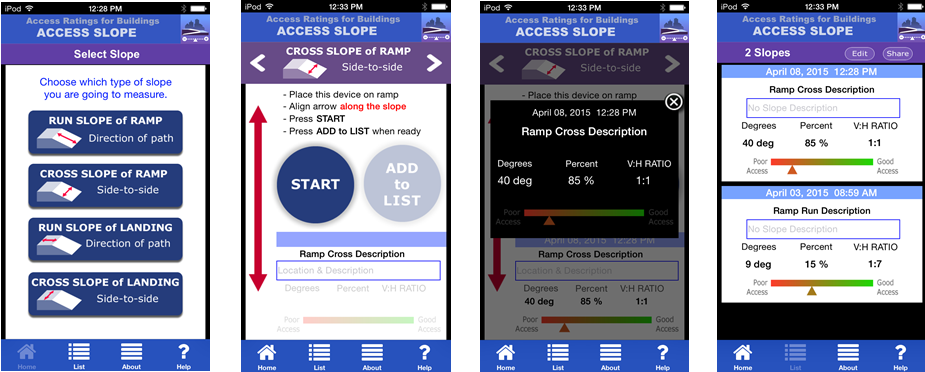
The year of 2020 marked the 30th anniversary of the Americans with Disabilities Act, which outlawed discrimination based on disability. In celebration of this monumental achievement, the Research Rehabilitation Disability and Design (R₂D₂) Center has released the first version of the AccessRatings for Buildings MiniTools apps, which measure the accessibility of public buildings based on noise level, ramp accessibility, and space for ambulation. Each app, AccessSlope, AccessRuler, and AccessSound, can be purchased at the Apple App Store for $0.99.
AccessSlope measures the incline of any ramp located in a public space by producing three specific measurements: the degrees, percent, and vertical-to-horizontal ratio to determine the run and cross– slope of the ramp and landing. AccessSlope provides information useful to those who require the use of a ramp to access a building. This app is easy to use, convenient, requires only three seconds per measurement, and allows the user to add additional comments describing other aspects relevant to accessibility to be saved and exported. All of the MiniTools apps have the ability to export collected data into the AccessTools app, which can be used by trained raters to assess overall building accessibility.
AccessRuler measures the distances within a public space for accessibility purposes, such as doorways or pathways between tables. This app requires use of a Leica Distance Laser meter to be connected to your iPad or iPhone via Bluetooth to import distance measurements into your AccessRuler application. Information gathered from this app can be used to determine whether any given public space is accessible to wheelchairs and any other assistive device that individuals use to traverse.
Finally, AccessSound measures the decibel level of any public space to provide the audio level accessibility on a scale that ranges from quiet to loud. AccessSound presents the results of your audio measurement in two graphs that report mean and median decibel levels recorded in your audio samples, in comparison to common environmental sounds.
The AccessRatings for Buildings (ARB) MiniTools team members are Roger O. Smith, Mason Drake, Megan Sullivan, Kassy Bauman, Hannah Frank, and Stephanie Tkaczyk. Collaborators from Marquette University are Shiyu Tian and Dr. Sheikh Iqbal Ahamed, PhD.
The future of MiniTools applications is currently in development through the AccessLight app. AccessLight will be able to evaluate the lighting of a space by assessing task, ambient, and accent levels to determine accessibility on a scale from sufficient to poor.